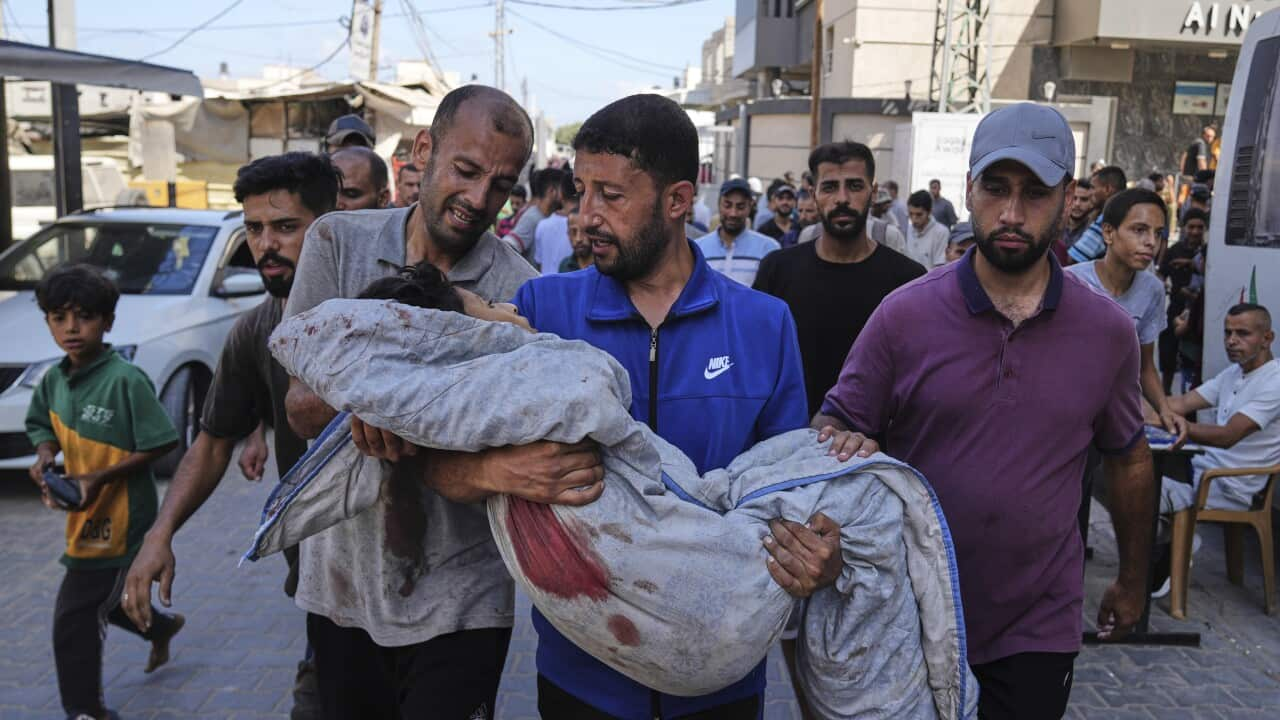At least eight Palestinians, most of them children, were killed and more than a dozen were wounded in central Gaza when they went to collect water, local officials said, in an Israeli strike which the military said missed its target.
The strike hit a water distribution point in Nuseirat refugee camp, killing eight and injuring 17 others, said Ahmed Abu Saifan, an emergency physician at al-Awda Hospital.
Water shortages in Gaza have worsened sharply in recent weeks, with fuel shortages causing desalination and sanitation facilities to close, making people dependent on collection centres where they can fill up their plastic containers.
The Israeli military said the missile had intended to hit an Islamic Jihad militant in the area but that a malfunction had caused it to fall "dozens of metres from the target".
Hours later, 12 people were killed by an Israeli strike on a market in Gaza City, including a prominent hospital consultant, Ahmad Qandil, Palestinian media reported.

Gaza's health ministry said more than 58,000 people had been killed since October 2023, with 139 people added to the death toll over the weekend.
The ministry said over half of those killed are women and children.
Ceasefire talks stalled
Negotiations aimed at securing a ceasefire appeared to be deadlocked, with the two sides divided over the extent of an eventual Israeli withdrawal from the Palestinian enclave, Palestinian and Israeli sources said at the weekend.
Israeli Prime Minister Benjamin Netanyahu was set to convene ministers to discuss the latest developments in the talks, an Israeli official said.
The indirect talks over a United States proposal for a 60-day ceasefire are being held in Doha, but optimism that surfaced last week of a looming deal has largely faded, with both sides accusing each other of intransigence.

Netanyahu, in a video he posted on Telegram, said Israel would not back down from its core demands — releasing all the hostages still in Gaza, destroying Hamas and ensuring Gaza will never again be a threat to Israel.
At least 20 of the remaining 50 hostages in Gaza are believed to still be alive.
Netanyahu and his ministers were also set to discuss a plan on the weekend to move hundreds of thousands of Gazans to the southern area of Rafah, in what Israeli defence minister Israel Katz has described as a new "humanitarian city" but which would be likely to draw international criticism for forced displacement.
An Israeli source briefed on discussions in Israel said the plan was to establish the complex in Rafah during the ceasefire, if it is reached.
On Saturday, a Palestinian source familiar with the truce talks said Hamas rejected withdrawal maps which Israel proposed, because they would leave around 40 per cent of the territory under Israeli control, including all of Rafah.
Israel's bombardment of Gaza has displaced almost the entire population of more than 2 million people, but Palestinians there say nowhere is safe in the coastal enclave.
A missile hit a house in Gaza City on Sunday where a family had moved to after receiving an evacuation order from their home in the southern outskirts.
"My aunt, her husband and the children, are gone. What is the fault of the children who died in an ugly, bloody massacre at dawn?" said Anas Matar, standing in the rubble of the building.
"They came here, and they were hit. There is no safe place in Gaza."
For the latest from SBS News, download our app and subscribe to our newsletter.

